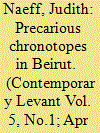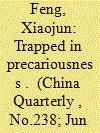| Srl | Item |
| 1 |
ID:
172379


|
|
|
|
|
| Summary/Abstract |
This article argues that the intersection of time and space in large parts of the Levant is, above all, precarious. With a close analysis of two meaningful places in Beirut – the shrine of Rafic Hariri and the nightclub B018 – the article seeks to tease out how such a precarious chronotope is given form, meaning and value through narratives, practices and spatial design. Moreover, the article builds upon Walid Sadek’s conceptualisation of shared mourning as a possibility for a new sociality under Lebanon’s precarious conditions. It argues that despite their engagement with loss, the two sites under scrutiny here do not allow for such an ethical position. The findings of the analysis are relevant for the Levant more broadly as the flows of refugees in recent years have produced new and particularly precarious geographies inscribed with a profound sense of loss and grief.
|
|
|
|
|
|
|
|
|
|
|
|
|
|
|
|
| 2 |
ID:
148292


|
|
|
|
|
| Summary/Abstract |
Dominant discourses of immigrant value in Taiwan and across Asia distinguish marital immigrants from desirable professional immigrants who are assumed to contribute their talents and economic productivity to their new home. This article examines national anxieties about the compromised value of marital immigrants and it illustrates the strategies adopted by immigrant spouses as they carve out new means of producing value through productive and reproductive labors. Focusing on mainland Chinese spouses in Taiwan, the article argues that contested political relations between Taiwan and China foster immigration policies that construct Chinese marital immigrants as familial dependents whose material desires and suspect political commitments are held in check by their identification with reproductive and care labors. The article asks how this complex devaluation system affects the life strategies of comparatively elite marital immigrants, Chinese women and men with postsecondary degrees and former professional careers in China. The article analyzes how these immigrants maneuver around policies that restrict their access to skilled employment, yet without necessarily rejecting their reproductive contributions to Taiwanese society. Elite spouses experience new forms of precariousness produced by the intersection of intimate life decisions with heteronormative gender roles, aspirations for self-fulfillment, and the insecurities of immigrant status.
|
|
|
|
|
|
|
|
|
|
|
|
|
|
|
|
| 3 |
ID:
166873


|
|
|
|
|
| Summary/Abstract |
This article develops an integrated perspective to study whether formalization can significantly reduce precariousness for informal workers. This perspective combines the analysis of employment dualism with that of rural–urban dualism and the analysis of the production sphere with that of the social reproduction sphere. By applying this integrated framework to the case of a state-owned enterprise (SOE) in China, this article finds that formalization does little to reduce precariousness for the migrant agency workers there. Migrant agency workers in China are in a precarious position not only because of their employment status but also because of their incomplete citizenship and the commodification of social reproduction materials. With the compensation gap between formal and agency workers narrowed primarily owing to the deterioration of formal employment, formalization has little effect on increasing the income of agency workers or alleviating the financial pressure upon them in the sphere of social reproduction; neither can formalization raise migrants up to full citizenship or reduce related precariousness.
|
|
|
|
|
|
|
|
|
|
|
|
|
|
|
|